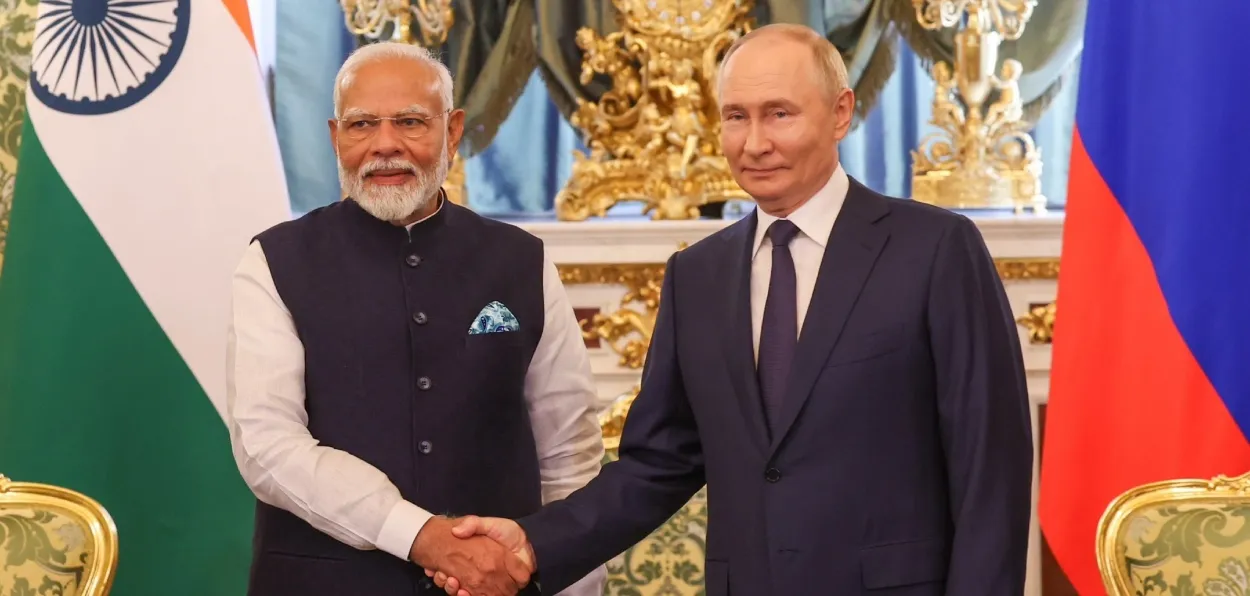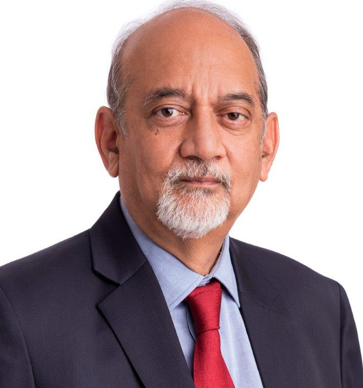
 D. P. Srivastava
D. P. Srivastava
Prime Minister Modi’s visit to Moscow has come at a crucial time. The Ukraine war has polarised relations between the East and the West and there is increased tension between the US and China over Taiwan, trade, and a host of other issues.
These two developments have brought together Russia and China. Modi’s visit has shown that Russia is not isolated. It also testifies to the fact that India follows an independent policy. President Putin accompanied PM Modi on a visit to the Atom pavilion showcasing the developments in science and technology. The visit culminated in a comprehensive Indo-Russian joint statement. This brought out the depth of India-Russia relations, as well as the convergence of views on several regional and international issues.
India and Russia have historical relations. The threat of Soviet veto ensured that there were no UN Security Council resolutions on the J&K issue after 1957. During the Bangladesh War in 1971, Russia exercised veto three times in the Council in support of the Indian position. It was also the first major power to resume cooperation in the civil nuclear power sector with India after the Pokhran II nuclear tests. It is a major supplier of weapons systems to India. It leased Chakra, the nuclear power submarine to India. The relationship has continued in the new millennium though India now has a more diversified supply system to meet its defence needs.
India and Russia have worked together in the energy sector. Russia has built four 1000 MW light water reactors at Kudankulam and is engaged in building two more at the site. It supplies LNG to India. OVL has a stake in the Sakhalin oil field in Russia. After the Ukraine war erupted, India emerged as a major market for Russian crude exports helping that country cope with the loss of markets in Europe. Cheaper oil helped India bring down the oil import bill. Moreover, it also helped the foreign exchange situation as part payment was in rupees.
Narendra Modi and Vladimir Putin at Atomic Center in Moscow
In the joint statement issued after the visit, Russia expressed appreciation for India’s efforts towards ‘reformed multilateralism’. This expression refers to the need for a more balanced structure of global governance. Russia expressed appreciation for India’s contribution as a non-permanent member of the UN Security Council during its term in 2021-22. It also ‘reiterated its support for India’s permanent membership of a reformed and expanded UN Security Council.’
The joint statement also brought out a convergence of views between India and Russia on international terrorism and violent extremism. Both countries have been victims of terrorist violence. The statement ‘strongly condemned the recent dastardly terrorist attack on an Army convoy in Kathua area of Jammu and Kashmir on 8th July 2024, in Dagestan on 23rd June and the Crocus City Hall in Mosfer on 22nd March.’ Both sides ‘called for zero tolerance for terrorism and expeditious finalisation and adoption of the Comprehensive Convention on International Terrorism.’
I as Joint Secretary (UNP) in the Ministry of External Affairs was one of the two co-authors of the draft of the Comprehensive Convention on International Terrorism (CCIT). I also negotiated UNGA approval for elaborating and adopting the CCIT. The Convention, once adopted, will allow member states to take action against terrorists without depending upon decisions of the Security Council, which is often paralysed due to threats or the use of the veto.
The joint statement ‘noted with appreciation the close coordination between India and Russia on Afghanistan.’ The two sides supported ‘an independent, united and peaceful state free from terrorism, war, and drugs, living in peace with its neighbours.’ The statement also covered respect for basic human rights and freedoms, including the most vulnerable sections of the Afghan society.’ The last category includes Shia Hazaras, women, and religious minorities. The statement ‘emphasised the important role of the Moscow Format meetings to facilitate the Afghan settlement.’
The joint statement also ‘welcomed the counter-terrorism measures against international terrorist groups, including in particular ISIS.’ There has been apprehension that the activities of these groups could destabilize Central Asian Republics. The statement ‘expressed confidence that the fight against terrorism in Afghanistan would be comprehensive and effective.’
The joint statement addressed the situations in Ukraine and Gaza. Each of these could have catastrophic consequences in case there is an escalation. The two sides ‘highlighted the imperative of peaceful resolution of the conflict around Ukraine through dialogue and diplomacy including engagement between the parties.’ This is reflective of the position taken by India consistently. The continuation of war has inflicted enormous suffering on the people of Ukraine. The war has also expanded in scope and intensity. Ukraine has carried out attacks inside Russia, while the Russians have stepped up attacks on Ukraine’s infrastructure.
The joint statement affirmed support for ‘immediate and unhindered delivery of humanitarian assistance’ to the Palestinian civilian population by UNSC resolution 2720. India and Russia also called for ‘the effective implementation of the UNSC resolution 2728 for a lasting and sustainable ceasefire.’ The two sides also called for ‘the immediate and unconditional release of all hostages.’ They ‘reaffirmed their support for Palestine’s full membership in the United Nations.’
Narendra Modi and Vladimir Putin reaffirm their committment of being friends
The thrust of the joint statement was to strengthen the bilateral relationship between the two countries. It mentioned that the two-way trade is already double the $ 30 billion target for 2025. The two sides agreed on a new target of $ 100 billion by 2030.
The joint statement also covered connectivity issues. It mentioned ‘Both sides will continue joint efforts to intensify the use of INSTC route in order to reduce the time and cost of cargo transportation.’ The International North-South Transport Corridor (INSTC) starts from Bandar Abbas port in Iran and runs north to the Caspian Sea shore. From there, one trunk goes east to Central Asian Republics, while the other trunk moves north to Moscow and St. Petersburg. According to one estimate, the INSTC route could reduce cost by 25 % and time by 40 % for reaching destinations in Russia.
The joint statement also highlighted the ongoing cooperation in the energy sector. There has been a sharp increase in India’s crude oil imports from Russia. The statement mentioned further an agreement ‘to explore new long-term contracts.’ The two sides ‘agreed to explore the possibility for further increasing supply of coking coal to India.’
The joint statement mentioned the ongoing cooperation between India and Russia in the civil, and nuclear sectors. Russia is completing the construction of six 1000 MW nuclear power plants in Kudankulam. The two sides also discussed a second site for building nuclear power plants as well as 1200 MW reactors. Nuclear power could play a major role in India’s energy transition to a low-carbon future while ensuring its energy needs are met adequately.
ALSO READ: Sharif's China visit and Pak's continuing economic woes
PM Modi’s visit to Russia has laid the foundations for taking the India-Russia relationship to a new level. The warmth of the reception accorded to Modi Ji brings out the fact that despite its proximity to China, Russia values its relationship with India. The visit has also demonstrated that India can maintain its strong ties with a time-tested friend while improving relations with the US.
The author is a former Ambassador to Iran and author of nForgotten Kashmir: The Other Side of the Line of Control.
